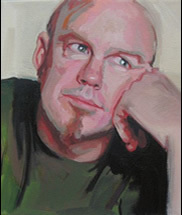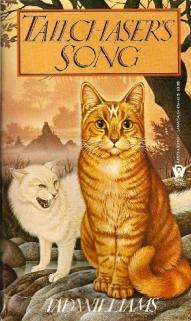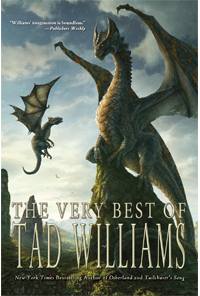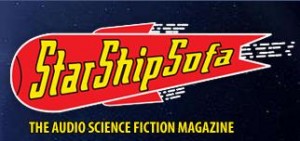 Tad Williams is a science fiction and fantasy author who has written many excellent novels, including the Otherland series and the Memory, Sorrow, and Thorn series. Shadowmarch is his current series in progress, with the third of fourth books scheduled to be released in early 2010 with the title “Shadowrise”. He is also writing a young adult series called Ordinary Farm with Deborah Beale, his wife, with the second book scheduled for 2010 titled “A Witch at Ordinary Farm.” Check out his website, and while you’re there, check out the message board.
Tad Williams is a science fiction and fantasy author who has written many excellent novels, including the Otherland series and the Memory, Sorrow, and Thorn series. Shadowmarch is his current series in progress, with the third of fourth books scheduled to be released in early 2010 with the title “Shadowrise”. He is also writing a young adult series called Ordinary Farm with Deborah Beale, his wife, with the second book scheduled for 2010 titled “A Witch at Ordinary Farm.” Check out his website, and while you’re there, check out the message board.
If you haven’t read his work, you’re missing out. Pick up a copy of one his novels, starting with The City of Golden Shadow, the first book in the Otherland series.
David: On your site you mention that you’ve “had more jobs than any sane person should admit to”. Not including writing, what was the job you liked the most? Hated the most?
Tad: Liked the most? Probably working at Apple, mostly because it was interesting observing the culture. I also liked doing instructional film strips and manuals as a technical artist. It was a fun company and I liked the people. I was the best at drawing hands! Least favorite was probably my time as a business-drone in a suit and tie, collecting overdue loan payments from deadbeats and sad, broke people.
David: At what point in your life did you decide you wanted to be a writer?
Tad: When I was offered my first multi-book contract. I always knew I wanted to be a CREATOR, but what form that creating would take was very much up in the air. If I’d been offered a contract first to do cartooning or screenwriting this would be a much different interview today.
David: How did you pull off the first big sale to DAW? Did you get an agent before submitting?
Tad: Nope. I was an over-the-transom author — in other words, the slush pile. We were all lucky it worked out; we’ve helped each other sell a few books over the years.
David: If you had to pick one defining moment of your writing career to date, what would it be?
Tad: Oh, I think getting that first acceptance letter. That’s when you know it’s real. That’s when you begin to think, “Maybe my life does have some shape after all…!”
David: The Otherland series is one of my favorite stories of all time. The journey of a thousand miles begins with a single step, so what was the first step when you came up with this one. Where did the plot for this one start snowballing in your head?
Tad: I used to say (truthfully) that it began when I heard the author of “A River Runs Through It” being interviewed on the radio, and began thinking about rivers-as-metaphors, and then about a river that was ONLY a metaphor, which led me to the virtual river that runs through the story. But I realized later that it really started when I was six and captivated by the Storybook Land ride (or whatever it was called) in Disneyland, where Snow White sits in the boat and says, “Oh, look, there’s Toad Hall! And Sleeping Beauty’s Castle!” as you sail past these little miniatures. That idea — all the stories on the banks of a single river — clearly was the true genesis of OTHERLAND.
David: Early on in Memory, Sorrow, and Thorn, there’s a scene where Simon sneaks through the throne room and looks at the throne, a scene which pays off two books later in a reveal about Bright-Nail’s true lineage. Do you labor over a scene like that more than others, because you know it’s going to tie in later?
Tad: No, because I often don’t know exactly why it’s significant when I write it. (I can’t remember in that case how much I knew.) If I’ve figure it out later I may make some changes in rewrite to make sure the point I want is clear but not oversold, but often I leave it the way it was so it slides past as naturally as possible. I pride myself that the best way to read my books is for the second time, to pick up the things that blended into the background the first time.
David: How different was the experience of submitting and publishing a young adult book, as opposed to novels for adults?
Tad: Hard to say because there were a lot of strange ups and downs on this one — our publishing company had to let several publishers and editors go, and one of them was ours, who had made a big deal out of our book. We were then handed to a new publisher whose work load had just gone from about 18 books to 60. She’s done a great job, but we obviously didn’t get as much attention as we would have. I’ll know better once things have stabilized a bit.
David: How has co-writing been different than writing solo? Is it easier or harder? How do you and Deborah split up the work?
Tad: The first book was all over the place because we started it and rewrote it several times. In general we plot together, then Deb is writing the first draft, then I’m rewriting, then we kick it around ’til we’re happy. As far as the process itself, we haven’t done it enough for me to be able to be really specific — after I rewrite the second volume I’ll be able to generalize better. I’m enjoying it, though, and she’s an excellent collaborator (and my favorite person.)
David: When writing a series, how far do you plan ahead? Do you know how it will end before you write a word, or is that still up in the air until you reach the ending? Do you prefer to outline or just write on the fly?
Tad: It’s always a tightrope walk between too much outline and too little. If you over-plan, then you lose the spontaneity, not to mention the fact that with a really big book it’s an exercise in complexity theory — you literally CAN’T figure everything out ahead of time. But if you don’t plan at all then your structure suffers, the story wanders, all kinds of bad stuff. So you have to find your own point of exquisite tension between the two, learn to trust yourself, and go for it.
David: Which do you like to read better, science fiction or fantasy?
Tad: Doesn’t matter. What I like best is good storytelling — and that’s true even for non-fiction. The outward form it takes is almost irrelevant, although I do like fantastical things. But if you asked me to name my ten favorite books they’d be pretty evenly split between several forms of fiction and some history and journalism.
David: What is your ideal writing environment?
Tad: A room with a decent view of the outdoors, good lighting, and lots of research material (which in my case means primarily books and the internet) close to hand. I use a computer, so I need one of those, too. And I like quiet, but I’m not a fanatic about it.
David: If you could only give one piece of advice to aspiring writers, what would it be?
Tad: Write. Write and write and write. Oh, and finish things. (That’s two, I know. Hey, you’re talking to Mr. Long Books.)
David: If you could meet one fictional character who was not created by you, who would it be and why?
Tad: The Blue Fairy, so she could make me into a real boy.
David: What was the last book you read?
Tad: Last book I FINISHED? “NOW DIG THIS — the Unspeaking Writings of Terry Southern”. Last book I read, probably a dozen pages of “The Battle of Hastings” this morning while I was hanging out with the dogs.
David: Your favorite book?
Tad: One of these: LORD OF THE RINGS, RIDDLEY WALKER, FEAR AND LOATHING IN LAS VEGAS, THE PROUD TOWER, THE ONCE AND FUTURE KING.
David: Who is your favorite author?
Tad: Couldn’t pick one. Me, I guess, because I’m always happy when nice things happen to that particular writer.
David: What was the last movie you saw?
Tad: In a theater? UP. On television? LOUDQUIETLOUD: A Film about the Pixies.
David: What is your favorite movie?
Tad: Pick one: WIZARD OF OZ, THE TIN DRUM, TOPSY-TURVY, TAXI DRIVER, MY FAIR LADY
David: Do you have any upcoming publications we should watch out for? Can you tell us a little bit about them?
Tad: The third and fourth parts (the ending) of the Shadowmarch series will be out next spring, SHADOWRISE and SHADOWHEART. Then not too long after we’ll have our second Ordinary Farm book, tentatively titled A WITCH AT ORDINARY FARM.
David: Do you have any works in progress that you’d like to tell us about?
Tad: Just the next set of books, which should be a bit different — shorter, more modern, but still full of swingin’ action! (Sorry, I was channeling Stan Lee for a moment.) The first one should be called SLEEPING LATE ON JUDGEMENT DAY.
David: Thanks, Tad, for taking the time to answer these questions.
Also thanks to Craig Steffen, Gary Cuba, Chris Cuba, and Anthony Sullivan, for your contributions to the interview.
When I was offered my first multi-book contract. I always knew I wanted to be a CREATOR, but what form that creating would take was very much up in the air. If I’d been offered a contract first to do cartooning or screenwriting this would be a much different interview today.
 Tailchaser’s Song is a fantasy novel by Tad Williams, published by DAW books in 1985. The story is set in a world of anthropomorphized cats, a quest fantasy with the young cat Fritti Tailchaser as the hero. It is set in something like the real world, but from the perspective of cats, where humans are known as the race of M’an, descendents of cats who have been deformed by an ancient curse.
Tailchaser’s Song is a fantasy novel by Tad Williams, published by DAW books in 1985. The story is set in a world of anthropomorphized cats, a quest fantasy with the young cat Fritti Tailchaser as the hero. It is set in something like the real world, but from the perspective of cats, where humans are known as the race of M’an, descendents of cats who have been deformed by an ancient curse.


